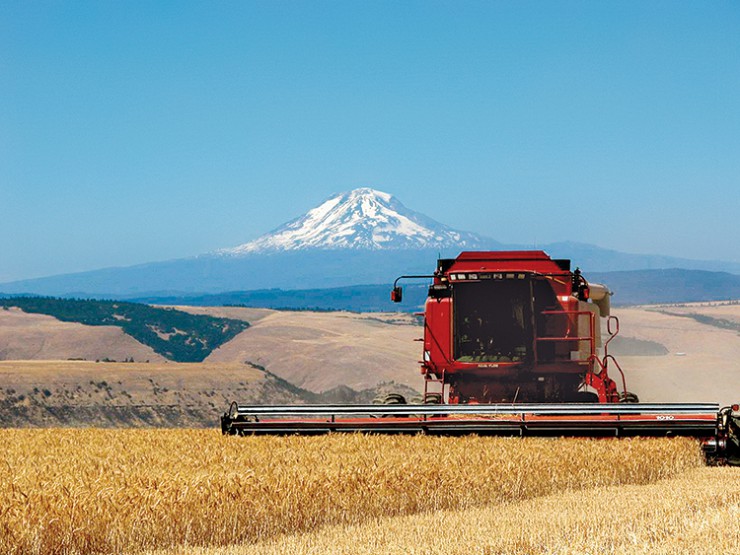Home > Oregon > Oregon Crops & Livestock > Wheat of the World in Oregon
Wheat of the World in Oregon

All flour is not created equal, which is why the special characteristics of Oregon wheat make it ideally suited for a wide variety of foods ranging from Asian noodles to Egyptian flatbread. The state’s wheat growers are experienced and reliable suppliers, and the wheat they grow produces flour with the desired protein, gluten, color and texture sought by bakers and producers around the world.
“Different wheat buyers require different protein levels for different products,” says Dave Shelton, executive director of the Wheat Marketing Center (WMC) in Portland. The center, the only of its kind in the country, focuses on improving the competitive edge of U.S. wheat through education and research. One way to achieve that goal is to fully understand the national and international characteristics and uses of wheat, and then demonstrate to potential buyers how Oregon wheat is ideal for uses ranging from baking pastries to rolling noodles. The WMC ’s test kitchens have helped develop a wheat product that is specific to the needs and desires of the export market.
![Oregon wheat [INFOGRAPHIC]](https://eadn-wc01-4177395.nxedge.io/wp-content/uploads/2014/08/Screen-Shot-2014-08-25-at-3.03.55-PM-740x304.png)
International Destinations
Ninety percent of the Oregon wheat crop is exported. Oregon’s port system exports more wheat to Asia than any other U.S. state.
The four top export destinations for soft white winter wheat for 2013 were Japan, South Korea, the Philippines and Yemen. Oregon growers provide customers’ preferred protein profiles, wheat coloration and other quality standards for sponge cake in Japan, confectionaries in the Philippines or flatbread in Yemen, Indonesia and Egypt.
“We have seen some recent expansion in global demand for soft white wheat used in flatbreads, as well as for snack foods,” says Shelton.

Other markets are growing. Shipments to Guatemala increased from 755,000 bushels in 2010 to 6.3 million bushels in 2013. “We’ll host a group of bakers from Guatemala in 2014,” says Shelton.
“Exports are everything for our industry,” says Darren Padget, a fourth-generation farmer harvesting more than 2,500 acres of soft white wheat annually. Padget is among the Oregon famers who have met with wheat buyers in Asia. “We’ve worked hard to build that market. Our customers know that our wheat will meet their quality standards.”
It’s fitting that wheat is an important export crop for the state. Oregon growers were among the first to enter the export market by delivering shipments of soft white wheat to Japan as early as the 1950s.

From the Farm
Wheat is grown in 24 of the 36 counties in Oregon. The state’s farmers grow mostly soft white wheat, between 50 million and 75 million bushels per year, valued at approximately $368 million in 2013. Soft white is about 90 percent of the Oregon wheat crop.
“The reason soft white wheat works so well here is that we grow it very well,” says Padget.
Climate is key. Padget’s dry land averages a foot or less of rainfall per year, requiring him to let half of his land lay fallow, without a crop. But the lack of moisture and humidity creates an environment resistant to moisture-loving wheat diseases.
Tyson Raymond, a 33-year-old farmer from Helix, says he benefits from new, higher-yielding soft white wheat varieties developed specifically for the Pacific Northwest climate. “Oregon farmers are experienced in growing high-quality wheat and developing the advanced techniques that help us adapt our product to the appetites and needs of our global customers,” he says.
The future of wheat looks bright in Oregon. Raymond and other growers use the most advanced technology and carefully selected varieties to grow top-quality wheat. Research at Oregon State University continues to focus on developing new varieties of wheat through breeding techniques in order to gain higher quality and higher yields, and through the WMC , enhancing baking and milling qualities will continue to be on the agenda.




Do most Oregon farmers use round up on the soft wheat to get high yields?